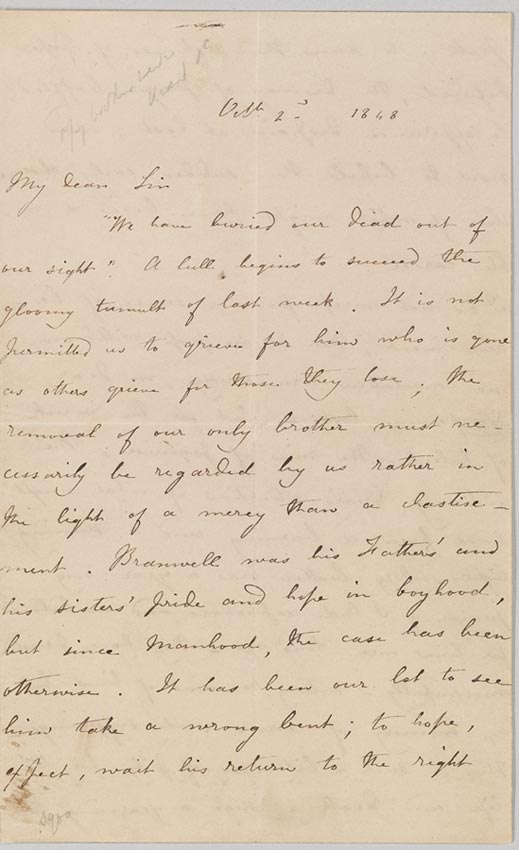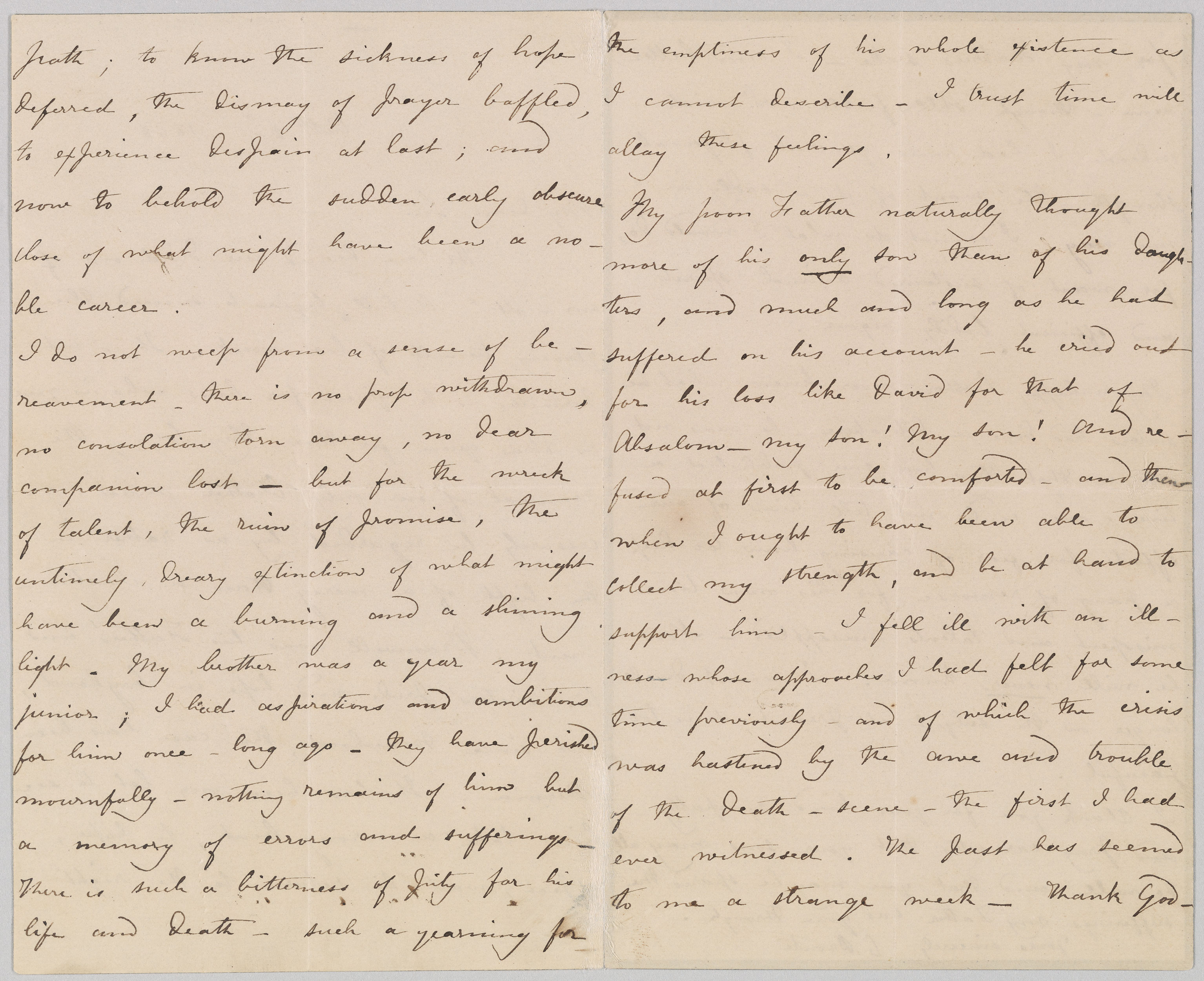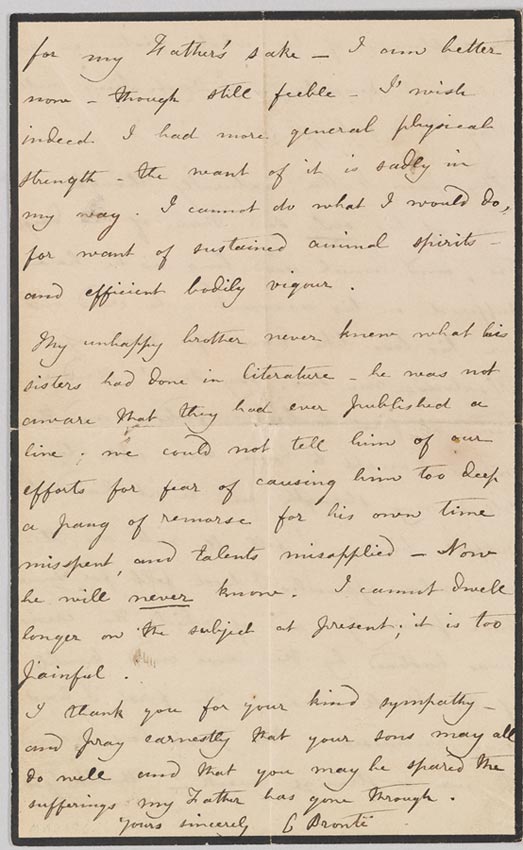8. Letter to William S. Williams, 2 October 1848, page 1

Letter to William S. Williams, dated Haworth, 2 October 1848
Henry H. Bonnell Collection, bequest of Helen Safford Bonnell, 1969
A few days after her brother, Branwell, died in 1848, Brontë used a sheet of mourning stationery to share the news with William S. Williams of the publishing firm Smith, Elder & Co., who had become a friend. Her grief was compounded by her anger that Branwell had, in her view, squandered his “burning” talent.
My dear Sir
“We have buried our dead out of our sight.” A lull begins to succeed the gloomy tumult of last week. It is not permitted us to grieve for him who is gone as others grieve for those they lose; the removal of our only brother must necessarily be regarded by us rather in the light of a mercy than a chastisement. Branwell was his Father’s and his sisters’ pride and hope in boyhood, but since Manhood, the case has been otherwise. It has been our lot to see him take a wrong bent; to hope, expect, wait his return to the right
Letter to William S. Williams, 2 October 1848, pages 2–3

Letter to William S. Williams, dated Haworth, 2 October 1848
Henry H. Bonnell Collection, bequest of Helen Safford Bonnell, 1969
A few days after her brother, Branwell, died in 1848, Brontë used a sheet of mourning stationery to share the news with William S. Williams of the publishing firm Smith, Elder & Co., who had become a friend. Her grief was compounded by her anger that Branwell had, in her view, squandered his “burning” talent.
path; to know the sickness of hope deferred, the dismay of prayer baffled, to experience despair at last; and now to behold the sudden early obscure close of what might have been a noble career.
I do not weep from a sense of bereavement – there is no prop withdrawn, no consolation torn away, no dear companion lost – but for the wreck of talent, the ruin of promise, the untimely, dreary extinction of what might have been a burning and a shining light. My brother was a year my junior; I had aspirations and ambitions for him once – long ago – they have perished mournfully nothing remains of him but a memory of errors and sufferings – There is such a bitterness of pity for his life and death – such a yearning for the emptiness of his whole existence as I cannot describe – I trust time will allay these feelings.
My poor Father naturally thought more of his only son than of his daughters, and much and long as he had suffered on his account – he cried out for his loss like David for that of Absalom – My Son! My Son! And refused at first to be comforted – and then – when I ought to have been able to collect my strength, and be at hand to support him – I fell ill with an illness whose approaches I had felt for some time previously – and of which the crisis was hastened by the awe and trouble of the death-scene – the first I had ever witnessed. The past has seemed to me a strange week – Thank God –
Letter to William S. Williams, 2 October 1848, page 4

Letter to William S. Williams, dated Haworth, 2 October 1848
Henry H. Bonnell Collection, bequest of Helen Safford Bonnell, 1969
A few days after her brother, Branwell, died in 1848, Brontë used a sheet of mourning stationery to share the news with William S. Williams of the publishing firm Smith, Elder & Co., who had become a friend. Her grief was compounded by her anger that Branwell had, in her view, squandered his “burning” talent.
for my Father’s sake – I am better now – though still feeble – I wish indeed I had more general physical strength – the want of it is sadly in my way. I cannot do what I would do, for want of sustained animal spirits – and efficient bodily vigour.
My unhappy brother never knew what his sisters had done in literature – he was not aware that they had ever published a line; we could not tell him of our efforts for fear of causing him too deep a pang of remorse for his own time misspent, and talents misapplied – Now he will never know. I cannot dwell longer on the subject at present; it is too painful.
I thank you for your kind sympathy – and pray earnestly that your sons may all do well and that you may be spared the sufferings my Father has gone through.
Yours sincerely
C Brontë